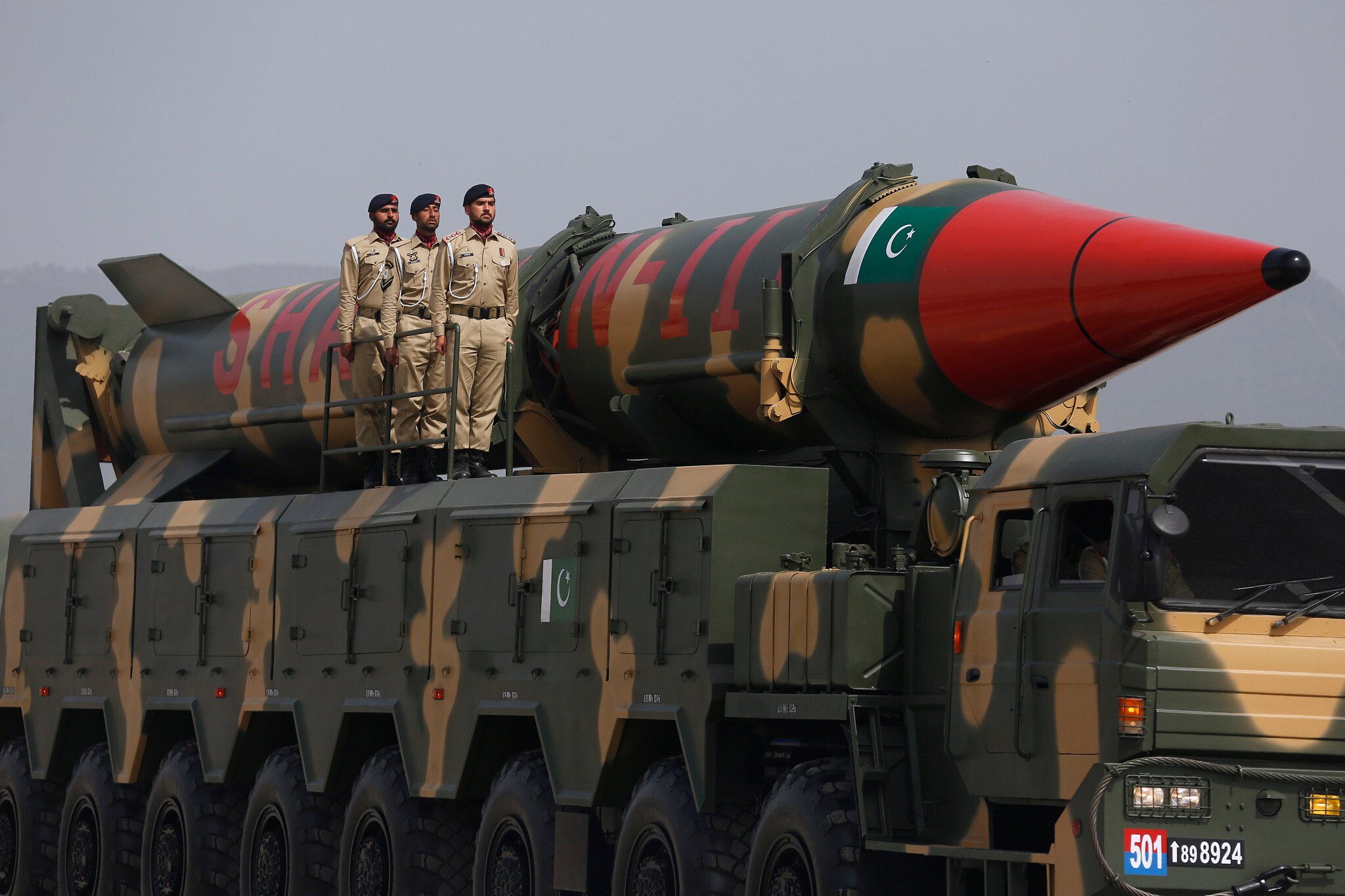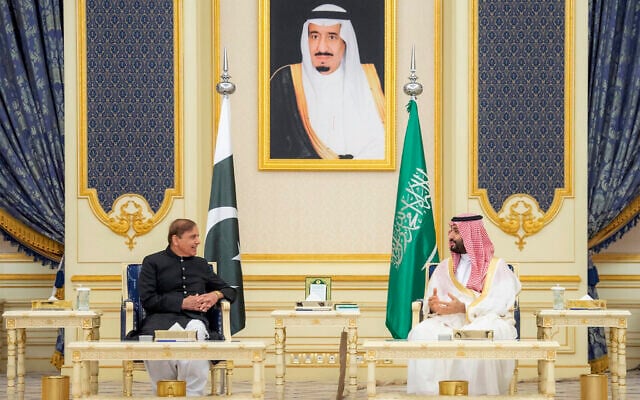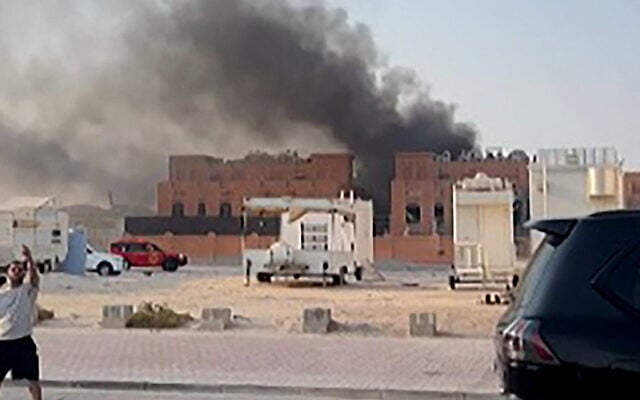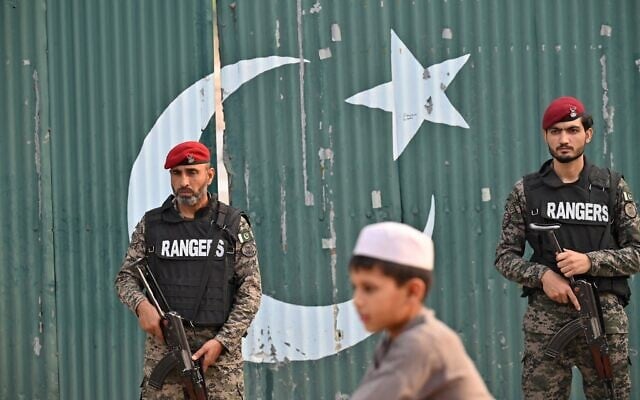


DUBAI, United Arab Emirates — Pakistan’s defense minister says his nation’s nuclear program “will be made available” to Saudi Arabia if needed under the countries’ new defense pact, marking the first specific acknowledgment that Islamabad had put the kingdom under its nuclear umbrella.
Defense Minister Khawaja Mohammad Asif’s comments underline the importance of the pact struck this week between Pakistan and Saudi Arabia, which have had military ties for decades.
The move is seen by analysts as a signal to Israel, long believed to be the Middle East’s only nuclear-armed nation. It comes after Israel’s attack targeting Hamas leaders in Qatar last week killed six people and sparked new concerns among Gulf Arab nations about their safety as the Israel-Hamas war devastated the Gaza Strip and set the region on edge.
Speaking to Geo TV in an interview late Thursday night, Asif made the comments while answering a question on whether “the deterrence that Pakistan gets from nuclear weapons” will be made available to Saudi Arabia.
“Let me make one point clear about Pakistan’s nuclear capability: that capability was established long ago when we conducted tests. Since then, we have forces trained for the battlefield,” Asif said.
“What we have, and the capabilities we possess, will be made available to (Saudi Arabia) according to this agreement,” he added.
The two countries signed a defense deal Wednesday declaring that an attack on one nation would be an attack on both.

The International Atomic Energy Agency, with which both nations have monitoring agreements, did not immediately respond to a request for comment over the Pakistani defense minister’s remarks.
Asif criticized Israel in the interview for not fully disclosing its suspected nuclear weapons program to the IAEA.
Israel is not a signatory to the Treaty on the Non-Proliferation of Nuclear Weapons (NPT) and maintains a policy of ambiguity, neither confirming, not denying that it has nuclear weapons.
Israel has not commented on the two nations’ defense pact. Pakistan has long been hostile to Israel and pro-Palestinian, but has not been directly involved in any war against it.
And while neither nation has diplomatic ties to Israel, American officials had sought to mediate a diplomatic recognition deal involving Saudi Arabia before Hamas’s October 7, 2023, attack on Israel killed some 1,200 people and saw another 251 taken hostage, sparking the war.

Saudi Arabia had said it was willing to sign a normalization deal with Israel conditional on the establishment of a Palestinian state.
Israel has no conflict with Saudi Arabia, which also has a long, tense rivalry with Iran.
“We have not named any country whose attack would automatically trigger a retaliatory response. Neither has Saudi Arabia named any country, nor have we,” Asif said in the interview. “This is an umbrella arrangement offered to one another by both sides: if there is aggression against either party — from any side — it will be jointly defended, and the aggression will be met with a response.”
The deal came a week after the attack on a gathering of Hamas leaders in Doha as Gulf Arab countries weigh how to defend themselves. Israeli strikes since October 7, 2023, have stretched across Iran, Lebanon, the Palestinian territories, Qatar, Syria and Yemen.
Following the Hamas massacre, Iranian proxies including the Hezbollah group in Lebanon and the Houthis in Yemen began firing missiles into Israel and carrying out attacks.
Israel’s attack on Iran targeted its nuclear and missile program along with senior military leaders and nuclear scientists. The US also carried out strikes on nuclear sites.
The pact also comes after most the serious military confrontation between the nuclear-armed rivals, India and Pakistan, in decades, erupted in May, including missile and drone strikes. The fighting was triggered by the mass shooting of tourists the previous month in Kashmir that India blamed on Pakistan.
Asked if others could join the pact, the minister added: “I can say the door is not closed to others.”

That idea was repeated by Pakistan’s Deputy Prime Minister Ishaq Dar.
“It is premature to say anything, but after this development, other countries have also expressed a desire for similar arrangements,” Dar told reporters in London in televised remarks.
“Such things follow due process. Even with Saudi Arabia, it took several months to finalize,” he said, indicating the deal was in the works before Israel’s strike in Qatar.
Saudi Arabia has long been linked to Pakistan’s nuclear program. Retired Pakistani Brig. Gen. Feroz Hassan Khan has said Saudi Arabia provided “generous financial support to Pakistan that enabled the nuclear program to continue, especially when the country was under sanctions.” Pakistan faced US sanctions for years over its pursuit of the bomb, and saw new ones imposed over its ballistic missile work at the end of the Biden administration.
Pakistan developed its nuclear weapons program to counter India’s atomic bombs. India is believed to have an estimated 172 nuclear warheads, while Pakistan has 170, according to the US-published Bulletin of Atomic Scientists.
Pakistan’s Shaheen 3 ballistic missile, believed to be able to carry both conventional and nuclear warheads, has a maximum range of 2,750 kilometers (1,700 miles) — making it capable of reaching Israel.

